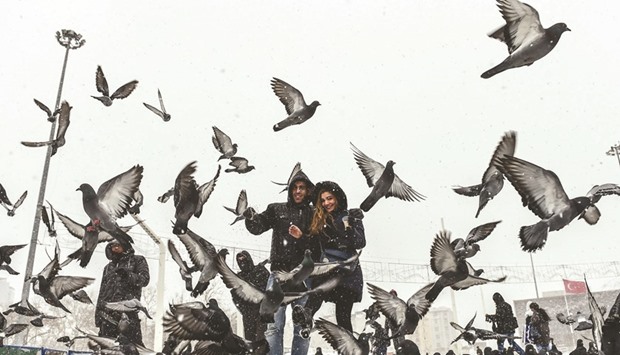Freezing conditions struck many parts of Europe yesterday, causing a number of deaths in hundreds of weather-related incidents from France to Turkey.
Germany’s weather turned Arctic, with one part of Saxony registering a low of -31.4° Celsius and many regions seeing their coldest temperatures so far this winter.
The cold weather front dubbed Axel sent icy rain across many areas, with the northern part of the country the worst hit.
Dozens of pedestrians slipped on the ice and injured themselves in Hamburg, leading to some 50 call-outs by the emergency services in the space of two hours.
Temperatures were expected to edge back up at the start of the week.
In France, temperatures hit -13° C near the border with Germany.
Several cities opened gymnasiums as shelters for homeless people who would otherwise have to spend the night on the streets.
Temperatures in Moscow fell to -30° C overnight and to -24° C in Saint Petersburg where police found the body of a man who had died of hypothermia.
One homeless man was found frozen to death under a bridge in the Czech capital Prague.
One other man died of hypothermia when he fell through sheet ice covering a lake in Prague’s Hradistko district.
Italian authorities also reported the death of a homeless man, probably due to the cold.
They did not confirm reports that several other homeless people had died in previous days.
There was heavy snowfall in central Italy and also in the southeast where the airports at Bari and Brindisi as well as in Sicily were closed yesterday morning.
Ten of the latest victims of the cold perished in Poland where sub-freezing conditions remain with -14° C forecast this weekend.
“Seven people died on Friday in what was the deadliest day this winter,” said spokeswoman Bozena Wysocka from the Polish government centre for security (RCB).
“We recorded three other victims the previous day,” she said. “This takes to 53 the number of hypothermia victims since November 1.”
Istanbul’s Bosporus Strait was closed to shipping traffic yesterday as the city weathered a winter storm that caught many residents by surprise, the Anadolu news agency reported.
The halt meant ferry traffic between the European and Asian sides of the metropolis, which straddles the two continents, also had to be stopped.
In addition, hundreds of flights had to be cancelled.
Turkish Airlines cancelled hundreds of flights in and out of the city’s main Ataturk airport and state-run Anadolu agency said dozens of planes were diverted to other airports because of the heavy snowfall, which began on Friday evening.
About 6,000 of its passengers were transferred to hotels on Friday evening due to the cancellations and 20,000 meals were distributed to those stranded at the airport, Anadolu said.
Pegasus Airlines cancelled some 200 flights in and out of Sabiha Gokcen airport, on the Asian side of the city.
The Bosphorus strait, which runs through Istanbul, and the Dardanelles strait further south were closed to transit shipping due to poor visibility yesterday morning, Turkey’s coastguard authority said.
The straits are one of the world’s most important choke points for the maritime transit of oil, carrying over 3% of global supply, mainly from Russia and the Caspian Sea.
The waterways, connecting the Black Sea to the Mediterranean, also carry large amounts of grains from Russia and Kazakhstan to world markets.
The snow reached a depth of as much as 40cm (16”) in some outlying areas of Istanbul and thousands of council personnel worked through the night to keep roads in the city open, the municipality said.
Many drivers abandoned their vehicles and set off on foot, while some stayed in their vehicles for more than 10 hours overnight as they waited for road conditions to improve, the Dogan news agency said.
Istanbul’s underground train system operated through the night for passengers unable to get home on the city’s roads, which were disrupted by dozens of accidents by vehicles sliding on the icy surfaces, the municipality said in a statement.
In the Netherlands, several people were injured in hundreds of reported accidents.
One driver died when his car slid into a ditch, police said.
Roads became very icy and the train network was disrupted.
Hungary meanwhile saw its coldest weather in five years, hitting -23° C in the north, according to the national weather bureau.
Skiers in Austria and Switzerland were warned of a “serious risk of avalanches”.
One French skier died in an avalanche in the Swiss canton of Valais; in Austria’s Tirol a German skier survived an avalanche in the Fieberbrunn ski resort.
And in Bulgaria on Friday the frozen bodies of two Iraqi migrants were discovered by villagers in a mountain forest in the southeast of the country near the border with Turkey.
Greece likewise has seen fierce cold weather this past week.
In the north near the Turkish frontier a 20-year-old Afghan migrant died of the cold on Tuesday.
With more than 60,000 mainly Syrian refugees on its territory, Greece has moved many migrants to prefabricated houses and heated tents.
The temperature in Athens yesterday was 0° Celsius and down to -15° C in the north of the country.
The coldest temperature in Europe so far this winter was recorded on Friday in the Swiss village of La Brevine at -29.9° C.
That was still much warmer than the village’s record of the coldest temperature ever in Switzerland at -41.8° C on January 12, 1987.
The frigid temperatures expected to continue through the weekend.

People walk near pigeons on Istanbul’s Taksim Square
